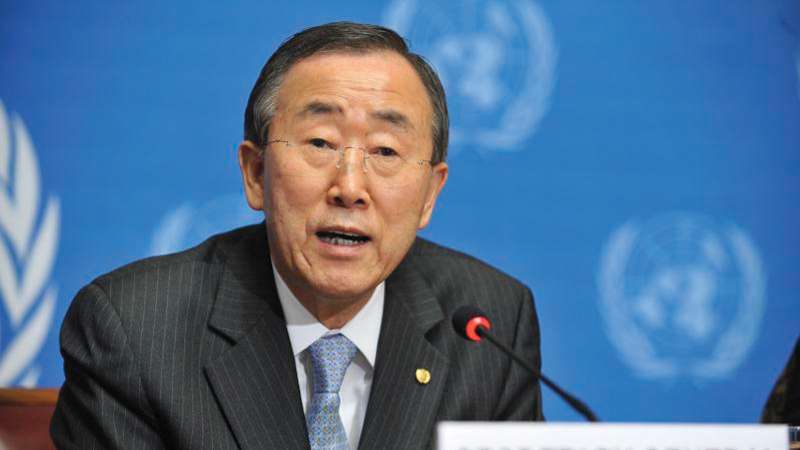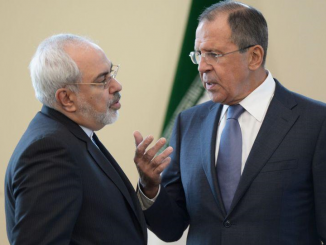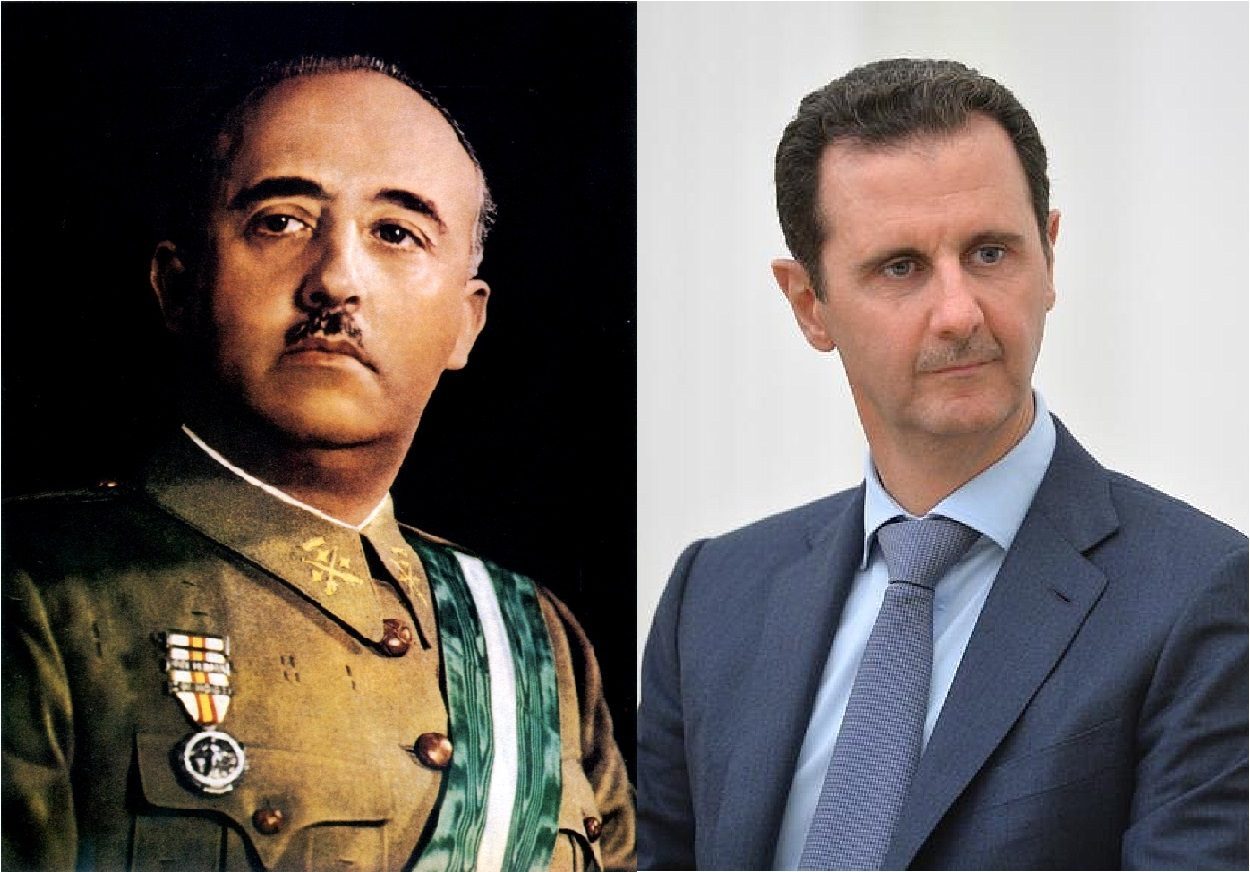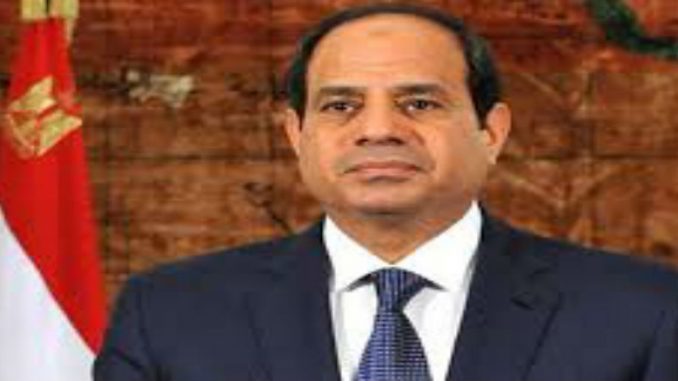
Recently, pro-Sisi media figures have launched several interviews that mainly served al-Sisi’s foreign policy.
This month, Egyptian T.V host Lamis al-Hadidi interviewed the Lebanese President Michel Aoun during his visit to Cairo.
A day before arriving to Egypt, Lebanon’s newly elected president defended Hezbollah in remarks he gave to a pro-regime private Egyptian TV station.
Aoun defended Hezbollah’s weapons, saying the arms of the Shiite group are “an essential part in defending Lebanon.”
He also described Hezbollah’ s military deployment on various Syrian battlefields as valuable additions to regional instability. He pointed out that the Shiite militia intervened in the fighting in Syria only when Lebanon was confronted with the terrorist threat.
He added, “Hezbollah’s presence in Syria is directed against terrorist organizations on the ground like Daesh and the Al Nusrah Front.”
Aoun told the Egyptian TV network CBC that “As long as the Lebanese army is not strong enough to battle Israel … we feel the need for its existence. He added that Hezbollah “has a complementary role to the Lebanese army.”
Regarding the Syrian file and his statements about the importance of the continuation of “Bashar Al-Assad” in power as a resolution to the Syrian crisis, Aoun said that all negotiations proved the importance of this issue pointing that if al-Assad left power, Syria would turn to another Libya.
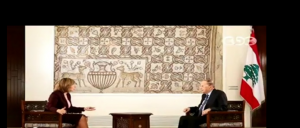
TV interview with Hafter in Egypt
In the same context, Youssef Al Hosseini interviewed Libya’s General Khalifa Haftar in Benghazi last week. The interview was broadcasted on ON T.V(pre-regime media). Haftar is the top military commander of the internationally recognized Libyan government.
During the interview, General Khalifa Haftar, leader of Libyan militias known as the Libyan National Army (LNA) loyal to the parliament in Tobruk, has hailed Abdel Fattah Al-Sisi of Egypt for his strength in getting rid of the Muslim Brotherhood.
He also praised al-Sisi saying that Egypt stood by Libya politically and morally, noting that despite Egypt’s stance against the Muslim Brotherhood during Morsi’s presidency, Libya would have been in great danger.
Haftar, who is well-known for his anti-Islam position, told Egypt’s ‘On TV’ that the Brotherhood had not existed in Libya until it went there from Egypt.
General Haftar, who has been trying to control the country by force of arms, added “All praise to Allah that a strong hand — Al-Sisi’s hand — appeared on time and got rid of the Brotherhood.”

Furthermore, Youssef al-Hosseini also recorded an episode for his show at ON T.V. about Aleppo, last January, under the auspices of the Syrian regime and Bashar al-Assad’s intelligence. Al-Hosseini noted at the time that “This is the first Arab program that goes to Aleppo.”
Al-Hosseini said in his show that he called his journey “The Escape to Aleppo” which was launched from Cairo to the Syrian capital Damascus and then to Aleppo that is 440 km far from the Syrian capital.
He said, “The Syrian city of Aleppo is filled with the smell of death and taste of blood and there you can watch the great destruction and devastation,” he also pointed that he has seen, “a tragedy in travelling for 6 or 7 hours because of the security checkpoints until he reached Aleppo.
Egypt’s Media and Al-Sisi’s Foreign Agenda
It seems that Abdel Fattah al-Sisi is deploying his media arms within the context of his foreign policy agenda.
For instance, al-Hosseini’s visit to Aleppo as well as Aoun’s interview with CBC channel can be interpreted in the light of Egyptian regime bias and support for the Syrian regime, Russia, Iran and Hezbollah against the Syrian opposition supported by Saudi Arabia.
It is worth to mention that al-Sisi expressed his support for the Bashar al-Assad’s military forces in its war against “terrorists” last November, a position at odds with his country’s Gulf benefactors especially Saudi Arabia.
In response, al-Assad welcomed Abdel Fattah al-Sisi’s statements on supporting his army last December in an interview with al-Watan, a Syrian newspaper, saying, “We hope that al-Sisi’s statements would be reflected on improving the relations between both countries.”
Several media reports highlighted recently that Egypt is getting more involved in the Syrian issue amid Cairo’s rapprochement towards the Russian axis.
Last November, some media reports revealed that al-Sisi has sent military troops to support al-Assad’s regime.
Al-Safir, a Lebanese newspaper close to the Shiite militant group Hezbollah, revealed that an Egyptian unit that includes 18 Egyptian pilots has started to work at Hamah military airbase in Syria since November 22.
18 pilots were part of a special helicopter squadron operating at Hamah airbase and have been at the base since 12 November, according to the same source.
It is not known if the pilots have already participated in airstrikes or not, but their presence at Hamah airbase shows that there is an Egyptian-Syrian decision to speed up merging the Egyptian pilots.
The first group of 4 high-ranking Egyptian officers from the Egyptian General Staff entered Syria and were deployed in the Syrian army’s general staff base in Damascus, adding that two Egyptian Major Generals started work in the Syrian army’s operations room a month ago, and their responsibility is leading reconnaissance operations, the latest of which was in Quneitra in Southern Syria, the Golan Heights and Daraa.
Arab sources were quoted saying that Cairo is also studying dispatching its ‘Thunder Forces’ to Syria to help the army more extensively in operations.
It also quoted senior Syrian security sources as saying that the Egyptians have promised Damascus to send their forces to Syria and will start massive participation in battles there on January 23, adding that Cairo’s military presence will go beyond its role in Hama airbase.
later,Sameh Shoukry, Egypt’s foreign ministry, dismissed the report as “imaginary”.
Last October, a top Syrian intelligence official discussed security coordination with his Egyptian counterpart amid warming ties between the two countries.
Syria’s state news agency SANA reported then that Syrian National Security Bureau chief Ali Mamlouk “made an official visit to Cairo,” where he met with General Khaled Fawzy, the head of Egypt’s General Intelligence Service, as well as other “senior security officials.”
SANA said “The two sides agreed to coordinate political stances,” adding that they also decided to “strengthen coordination in the fight against terrorism.”
In August 2015 Mamlouk, who has served as a diplomatic troubleshooter for the Bashar al-Assad regime, previously traveled to Egypt in August 2015.
Al-Mamlouk was appointed chief of the Syrian National Security Bureau in 2012. He currently supervises all Syrian security apparatuses. Al-Mamlouk’s name is one of several Syrian names listed by imposed E.U. sanctions.
In the same context, Al-Masdar News (AMN), had reported that a group of officers from the Egyptian Army traveled to the port-city of Tartous, Syria to train with Russia’s military advisors near the Islamic State’s front-lines.
Al-Masdar News had claimed it quoted some local activists saying that the Egyptian officers were accompanied by Russian military personnel upon their arrival to Tartous.
The Syrian crisis has triggered the tensions between Egypt and Saudi Arabia when Egypt voted in favor of a Russian-backed draft resolution, which was opposed by Saudi Arabia, in the UN Security Council on Syria last October.
Egypt’s major Gulf backer which condemned Egypt’s vote and described it as a “painful” stance.
After the voting, the Saudi ambassador to the UN, Abdullah al-Mouallimi said, “It was painful that the Senegalese and Malaysian stance was closer to the Arab’s consensus than the Egyptian delegation.”
He also said that he feels pity for these countries that voted for the Russian resolution, stressing that his country will continue backing the Syrian people by all means.
Two days following the voting, Saudi state-owned oil company Aramco announced halting oil product supply to Egypt.
The sudden halt, triggered a scornful media campaign against Saudi Arabia, as it was seen as a political decision.
On the other side, Saudi journalists and media men criticized the Egyptian regime and blamed the kingdom or its financial generosity to the al-Sisi regime.
In the same context, al-Sisi’s support to General Khalifa Haftar is publicly obvious as both military leaders praised one another in various occasions.
In addition, Al-Sisi has also played a major role in empowering General Haftar’s position politically and militarily in Libya, especially by focusing on amending the Political Agreement (PA) article that outlined the authorities of the Libyan army chief commander and that also excluded Haftar from leading the army.
Moreover, recent media reports pointed that al-Sisi would play a major role in presenting Haftar as the best option to the new US administration, by portraying Libya’s strong military man as a bulwark against extremism and terrorism in Libya.
Haftar is a military figure, backed by Tobruk government based in eastern Libya that refuses to recognize the U.N.-backed government, enjoys the support of several Arab nations, including Egypt, the United Arab Emirates, and Jordan, as well as western countries as France.

